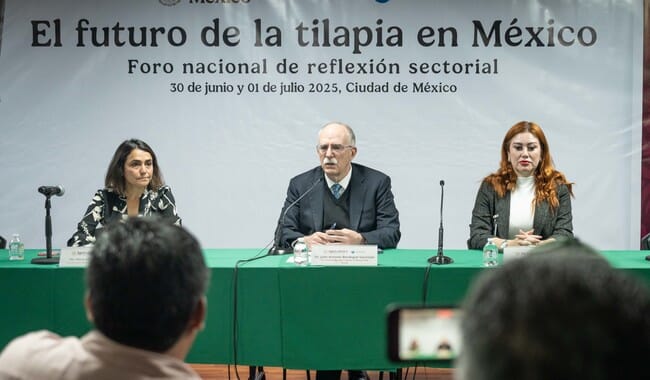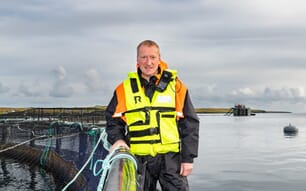
© Gobierno de México
According to Mexico’s federal government, at least 81,000 people are engaged in aquaculture; 45,000 of them in tilapia production, of whom 90 percent are small-scale producers. During the opening of the forum, organised by the National Commission for Aquaculture and Fisheries (Conapesca), Secretary Berdegué stressed that the Government will promote actions to achieve self-sufficiency in tilapia production. This species, he said, represents an important source of protein for human consumption and plays a significant role in food sovereignty.
"Today, a very significant part of the future of food production – both fish and seafood – lies in aquaculture. That is where we must make a strong investment," he added.
The high percentage of aquaculture dedicated to tilapia farming, gives it exceptional potential, not only in ensuring food sovereignty, but also in improving the wellbeing and quality of life of coastal and rural communities.
"President Claudia Sheinbaum Pardo constantly reminds us that the wellbeing of the people is the cornerstone of her government. Therefore, it is essential to produce more food and rely on science, technology and innovation," Berdegué reaffirmed in the presence of aquaculture workers, experts and officials from both Conapesca and the Mexican Institute for Fisheries and Sustainable Aquaculture Research (IMIPAS).
He explained that tilapia, a species known for its fast growth and adaptability to diverse environmental conditions, reached a production value of 2.664 billion pesos (€121 million) in 2024, with steady growth in aquaculture cultivation. He added that the government, through the Ministry of Energy, has access to the Electric Energy Savings Trust Fund – an instrument that could once again be used to support the fisheries and aquaculture sector. To do so, collaboration with state governments and other public institutions will be strengthened.
"There is a clear commitment from the Ministry of Agriculture, under the instruction of the President of Mexico, to prioritise fisheries and aquaculture," he emphasised.
Meanwhile, María José Espinosa Romero, general coordinator of operations and institutional strategy at Conapesca, agreed that tilapia is essential, as it sustains many families and contributes to achieving national food and nutritional security and sovereignty.
During the forum, tilapia producers presented the main challenges, opportunities and obstacles facing tilapia farming. Together with specialists, a short-, medium- and long-term strategic roadmap will be defined and followed up by Francisco Javier Martínez Cordero, general director of infrastructure at Conapesca.
"Count on Conapesca – we will work together on this shared goal of food security and a future of wellbeing and shared prosperity, through the development of tilapia in Mexico," said Espinosa Romero.



